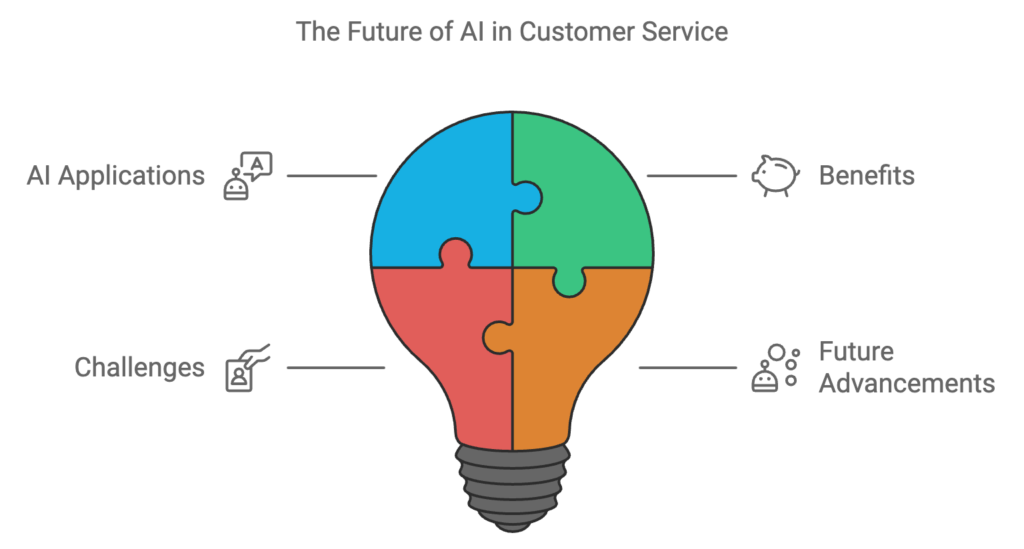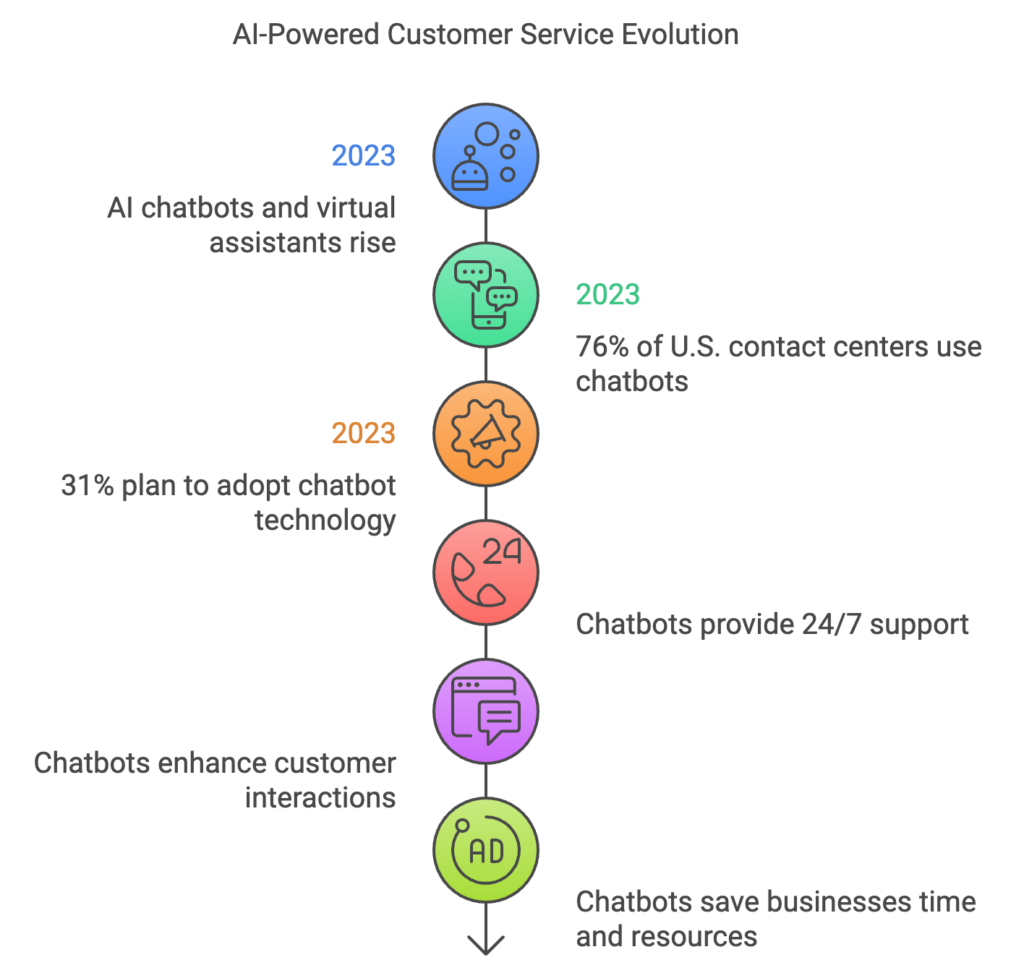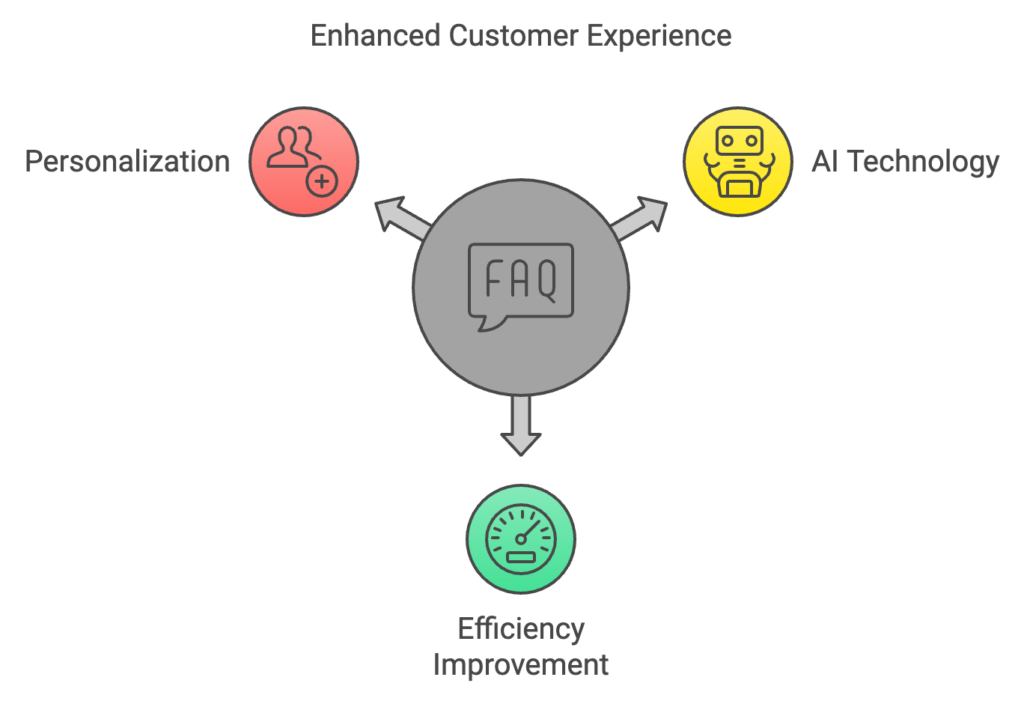Introduction
The Future of AI in Customer Service refers to the transformative role that artificial intelligence (AI) is poised to play in reshaping how businesses interact with their customers. As technology continues to advance, AI applications such as chatbots and virtual assistants have become increasingly integrated into customer service frameworks, enhancing efficiency and improving overall customer experiences. This evolution is significant, as it aligns with rising consumer expectations for immediate, personalized responses, leading to a projected 80% adoption of generative AI technologies by customer service firms by 2026.[1][2].
The current landscape showcases a marked shift toward AI-driven solutions, with 76% of U.S. contact centers already employing chatbots. These digital tools provide round-the-clock support, streamline interactions, and significantly reduce operational costs, with estimates suggesting potential savings of $11 billion annually for businesses.[3][4]. However, the rise of AI in customer service is not without challenges. Concerns surrounding data privacy, ethical implications, and potential biases in AI responses are prominent controversies that organizations must navigate to maintain consumer trust and compliance with regulations like the General Data Protection Regulation (GDPR).[5][6].
In the coming years, advancements in natural language processing (NLP) and generative AI are expected to further enhance the capabilities of customer service technologies. This includes more advanced personalization, predictive analytics for anticipating customer needs, and improved multilingual support to cater to diverse customer bases.[7][8]. While the future holds promising prospects for AI in customer service, stakeholders are urged to prioritize responsible AI practices to address ethical concerns and ensure equitable service delivery.[7][9].
Overall, the integration of AI in customer service represents a significant paradigm shift that not only enhances operational efficiency but also redefines customer engagement in a digital-first world, setting the stage for a more responsive and personalized customer service landscape.

Historical Context
The evolution of customer service has undergone significant transformations over the decades, reflecting shifts in technology and consumer expectations. Initially, customer service relied heavily on person-to-person interactions, which often took the form of face-to-face communications or phone calls. However, the advent of the internet marked a pivotal moment, allowing businesses to harness digital channels for customer interactions.
In the early stages of digital transformation, companies began offering email support, enabling customers to reach out at their convenience. This was quickly followed by the implementation of live chat systems, which facilitated real-time communication and improved customer engagement. The rise of social media further revolutionized customer service, creating new avenues for businesses to interact with customers in a more personal and immediate manner[1][10].
As customer expectations evolved, so too did the need for more efficient and effective service solutions. Today’s consumers demand prompt and personalized responses to inquiries, placing additional pressure on businesses to adapt[2][11]. The incorporation of artificial intelligence (AI) into customer service is a direct response to these changing expectations. AI technologies, such as chatbots and virtual assistants, have begun to automate various elements of customer care, addressing many traditional challenges and enhancing the overall customer experience[3][12].
The impact of AI on customer service is profound, marking a significant shift in how companies interact with their clientele. With 80% of customer service companies projected to utilize generative AI by 2026, the role of AI is set to expand even further, promising a future where customer service is more efficient, effective, and aligned with the demands of a rapidly evolving market[13][12].
Current Trends
The landscape of customer service is undergoing a significant transformation driven by advancements in Artificial Intelligence (AI) and Natural Language Processing (NLP). As of 2023, one of the most notable trends is the increased adoption of AI-powered chatbots and virtual assistants, which are reshaping how businesses interact with customers. A striking 76% of U.S. contact centers already employ chatbots, with 31% of those not currently using them planning to adopt this technology soon[3]. These digital assistants provide quick and efficient support around the clock, enhancing customer interactions while saving businesses time and resources[14][3].

Generative AI and Its Impacts
Generative AI has gained prominence, especially as highlighted in Gartner’s Hype Cycle for Emerging Technologies 2023, where it is positioned at the Peak of Inflated Expectations[7]. This technology is expected to yield transformative benefits in the next two to five years, heralding a new era of productivity and creativity across various sectors, including customer service. The focus is shifting towards responsible AI deployment, which addresses ethical considerations while enhancing service delivery[7].
Enhanced Customer Interactions
Modern AI chatbots are a marked improvement over traditional, rigid systems. They are capable of handling complex queries, learning from interactions, and providing more personalized experiences for customers. This includes the ability to conduct sentiment analysis, which allows AI systems to interpret customer emotions and guide human agents accordingly, thereby improving service quality[3][15]. The integration of real-time AI customer service chat translation further bridges language barriers, facilitating smoother communication with diverse customer bases[3].
Automation and Human Supervision
The future also anticipates more productive, task-oriented chatbots that will automate simple tasks while remaining supervised by human agents[16]. These bots will be capable of performing tasks through various platforms such as mobile applications, websites, and voice commands, enabling e-commerce customers to track orders and receive tech support more efficiently[16].
Data Privacy and Ethical Considerations
Despite the promising trends, the implementation of AI in customer service does present challenges, particularly concerning data privacy and security. Businesses must navigate customer concerns about data usage while ensuring compliance with regulations such as the General Data Protection Regulation (GDPR)[5]. A significant 98% of consumers expect brands to guarantee the privacy of their data, emphasizing the importance of transparent data practices in maintaining customer trust[5].
Benefits of AI in Customer Service
AI technology is significantly transforming customer service by enhancing efficiency and improving the overall customer experience.
Enhanced Customer Experience
AI-driven customer service tools provide instant responses to inquiries, effectively eliminating wait times and ensuring consistent service quality. This immediacy is crucial, as modern customers increasingly expect reliable assistance.[12][17] Additionally, 73% of shoppers believe that AI can improve their customer experience, indicating a strong demand for such technology in customer support settings.[18] The personalization capabilities of AI also allow businesses to tailor interactions based on historical data, which not only resolves issues more efficiently but also fosters a sense of value and care among customers.[12]

Increased Efficiency and Cost Savings
AI-powered systems can handle a high volume of inquiries simultaneously, making them particularly effective during peak periods. They can reduce human errors, enhance accuracy, and continuously learn to improve performance over time.[19] This efficiency translates into cost savings, as businesses can minimize the need for large support teams while still meeting growing customer demands. Reports indicate that the use of chatbots could save businesses approximately $11 billion annually in customer service costs.[4]
Improved Customer Satisfaction and Retention
Implementing AI in customer service can significantly boost customer satisfaction and loyalty. For instance, around 80% of customers who have interacted with AI for customer service reported a positive experience.[18] Furthermore, support leaders utilizing AI have noted improvements in customer satisfaction (CSAT) scores, with 58% seeing measurable benefits.[20] This enhanced customer experience can lead to increased retention rates, as personalized and efficient service creates lasting loyalty.[12]
Reduced Agent Burnout
AI tools help lighten the workload for customer service agents by automating routine inquiries and tasks. This allows human representatives to focus on more complex issues that require their expertise, ultimately reducing agent burnout and improving job satisfaction.[21][20] By facilitating a more efficient division of labor, businesses can enhance team productivity while still delivering high-quality customer service.
Data-Driven Insights
AI systems are capable of analyzing customer interactions across multiple channels, providing businesses with actionable insights into customer behavior and preferences. By leveraging natural language processing (NLP), AI can even assess the sentiment behind customer feedback, enabling companies to adjust their strategies accordingly and improve service quality over time.[22]
Challenges and Limitations
Data Privacy and Ethical Concerns
One of the foremost challenges in implementing AI in customer service is navigatingdata privacy and ethical considerations. Organizations must ensure that data collected fromconsumers adheres to the principle of purpose limitation, which mandates that data is usedonly for the purposes disclosed at the time of collection.
As AI systems evolve, the potential for utilizing data in unforeseen ways may lead to difficulties in maintaining accurate disclosures and obtaining informed consent from consumers. This process is not merely a one-time requirement but an ongoing dialogue between the AI system and the consumer, emphasizing the need for transparency and customer control over their personal data[23].
Technical Implementation Issues
Moreover, poor implementation and maintenance of AI systems can result in suboptimal performance, which can negate the potential benefits. Many organizations face technical issues that arise from inadequate training of support teams in new AI technologies. This gap in skills can lead to increased costs and a fallback to traditional methods if the AI solutions do not meet expectations. Therefore, businesses must plan for both initial implementation costs and ongoing maintenance to ensure that their AI customer support systems are effective[24].
Risks of Inaccuracies and Bias
Another significant limitation lies in the potential for AI applications, particularly those based on large language models (LLMs), to produce factual inaccuracies. In customer care, providing incorrect information with high confidence can lead to unsatisfactory customer experiences. Furthermore, biases inherent in training data can result in unfair treatment of certain customer demographics, posing ethical dilemmas for organizations aiming for equitable service delivery. This risk necessitates careful oversight and a robust system for fine-tuning AI responses to minimize errors and biases[6].

Regulatory Compliance Challenges
Regulatory challenges also present a considerable barrier to effective AI implementation. Different countries have varying data privacy laws, which can complicate compliance for global organizations. For instance, while the U.S. Privacy Act of 1974 allows certain exceptions for data dissemination, the General Data Protection Regulation (GDPR) in the European Union imposes stricter requirements. Organizations must navigate this complex landscape, balancing ethical obligations with legal compliance, which can be particularly challenging in cases where individual preferences may conflict with regulatory demands[25][26].
Balancing Ethical and Legal Frameworks
The gap between ethical and legal requirements in data dissemination further complicates the use of AI in customer service. Ethical principles may dictate a broader release of data for societal benefit, whereas legal frameworks may impose stringent restrictions. This dichotomy necessitates a nuanced approach to data privacy that considers both ethical implications and regulatory mandates, particularly in scenarios where swift action could save lives, such as in emergencies[25].
Future Prospects
The future of customer service is increasingly intertwined with advancements in Artificial Intelligence (AI) and Natural Language Processing (NLP), particularly through the implementation of AI-driven chatbots and virtual assistants. These technologies are poised to revolutionize customer interactions by providing seamless integration across various channels, including social media, messaging apps, and voice assistants[ 8]. This omnichannel approach ensures a consistent and unified customer experience,contributing to significant business benefits such as a 10% year-on-year growth and increased customer engagement metrics[8].
Predictive Customer Service
One of the most notable trends is the incorporation of predictive analytics into customer service solutions. AI chatbots will increasingly be able to anticipate customer needs by analyzing past behaviors and patterns, enabling them to proactively offer solutions and recommendations[8]. Gartner forecasts that organizations embedding AI within their multichannel customer engagement platforms will see operational efficiencies rise by 25% by 2025, further highlighting the transformative potential of these technologies[7].
Advanced Personalization
The evolution of NLP AI chatbots promises unprecedented levels of personalization in customer service interactions. Future chatbots will be able to delve deeper into customer data, including preferences, purchase histories, and even sentiment analysis, to tailor experiences to individual users[8]. As noted in a report by PwC, AI is expected to become the “new normal” in customer experience, emphasizing the need for businesses to provide personalized, anticipatory services[8].
Enhanced Multilingual Support
As customer bases become increasingly global, the need for robust multilingual support is paramount. Future advancements in NLP will enable AI systems to accurately translate and interpret multiple languages in real time, thereby breaking down communication barriers[9][27]. This will not only enhance the customer experience but also allow businesses to reach a broader audience and improve service efficiency[27].
Enhanced Conversational Capabilities
Integrating generative AI into customer service chatbots will improve the authenticity of interactions, moving away from predefined dialogue flows to more lifelike and engaging conversations[9]. Advanced natural language understanding (NLU) capabilities will enable these systems to interpret human language with greater accuracy, leading to more meaningful exchanges between customers and support teams[1].
Ethical Considerations and Responsible AI
As AI and NLP continue to evolve, it is crucial for organizations to prioritize ethical considerations in their deployment. The focus on responsible AI practices will become increasingly important, particularly as these technologies impact various facets of business and society. Stakeholders must remain adaptable and conscious of the ethical implications as they harness the potential of these advancements[7].
Case Studies
Overview of Customer Service Case Studies
The exploration of real-life case studies provides valuable insights into the various scenarios businesses face and how they effectively manage customer service challenges.These case studies illustrate the significance of exceptional customer service and offer strategies for resolution, demonstrating the multifaceted approaches businesses can take to enhance customer satisfaction and loyalty[26].
Key Takeaways from Case Studies
Through the examination of these case studies, several key takeaways emerge that underscore the importance of effective customer service [26]:
AI Integration in Customer Service
Several companies are successfully integrating AI technologies into their customer service operations. For example, Delta Airlines utilizes AI to simplify customer interactions by offering a virtual assistant that helps customers manage flight changes and refunds[28]. The AI system aids customer service representatives by quickly accessing information, thus improving the overall efficiency and effectiveness of service delivery[29].
Additionally, platforms like Klaus and OneTone leverage AI to monitor customer feedback and interactions, enabling businesses to identify gaps in service quality and enhance performance outcomes[21]. These innovations reflect a broader trend towards using AI for tailored customer experiences, although organizations must carefully consider which technologies best align with their goals and customer needs[30].
By analyzing these case studies, businesses can derive practical lessons to improve their customer service strategies and leverage AI technology effectively, paving the way for a more responsive and customer-centric approach in the future.
Conclusion
The future of AI in customer service is undeniably transformative. As businesses continue to adopt AI-driven solutions, we can expect more seamless, personalized, and efficient customer experiences. From predictive analytics to multilingual support and advanced conversational capabilities, the possibilities are vast. However, the integration of AI into customer service isn’t without its challenges. Ensuring responsible AI practices, addressing data privacy concerns, and overcoming biases will be critical as these technologies evolve.
Ultimately, businesses that successfully navigate these complexities will be best positioned to deliver the kind of responsive, customer-centric service that defines the next era of engagement. By embracing AI, companies are not only enhancing operational efficiency but also redefining how they connect with their customers, building stronger relationships in a digital-first world.



